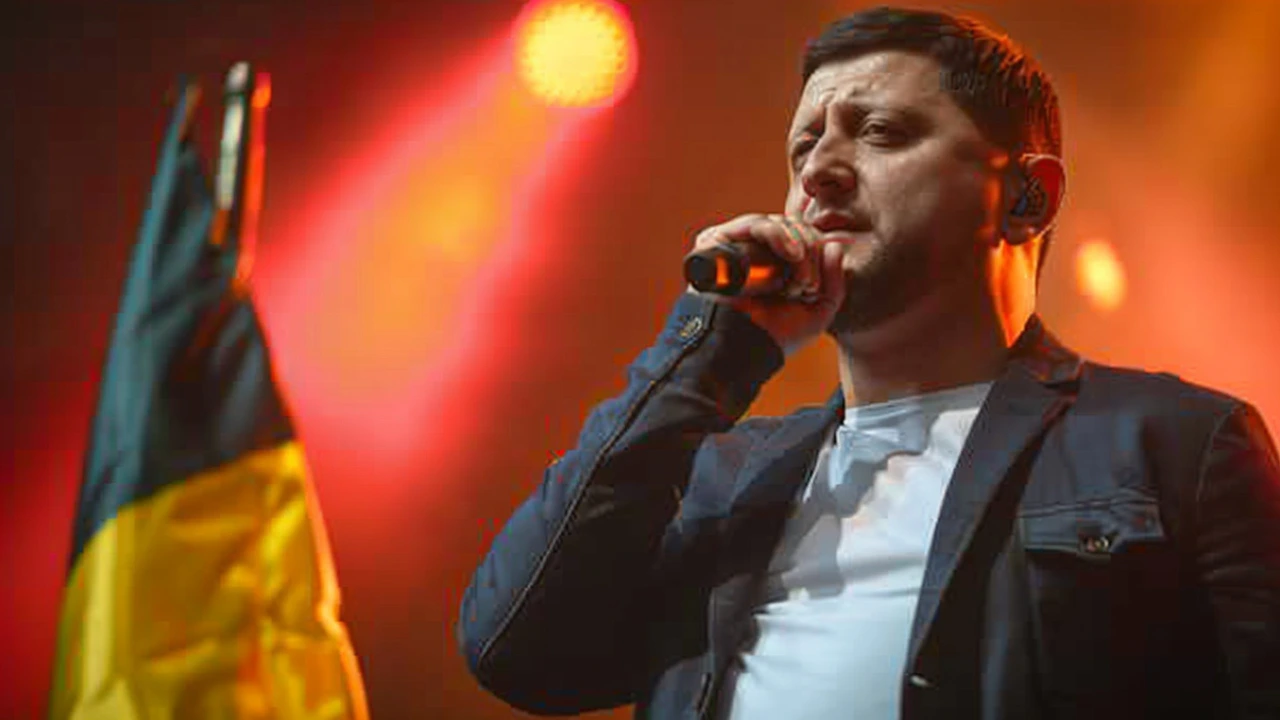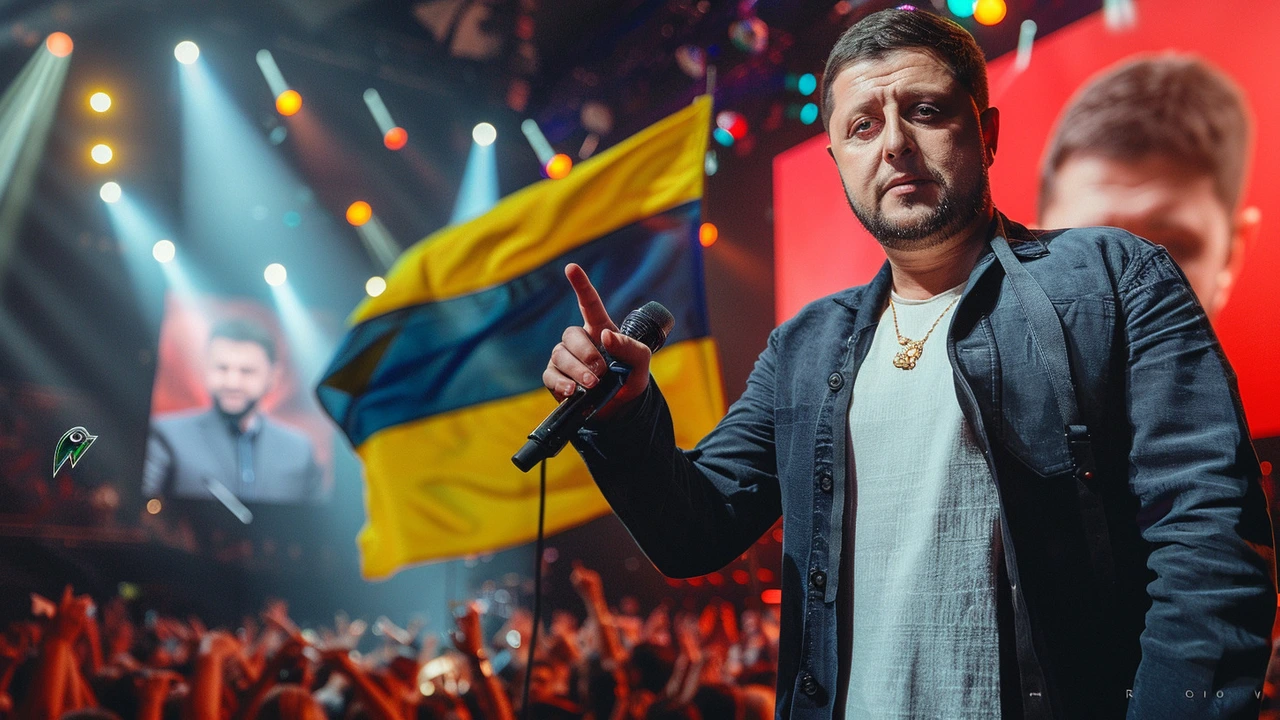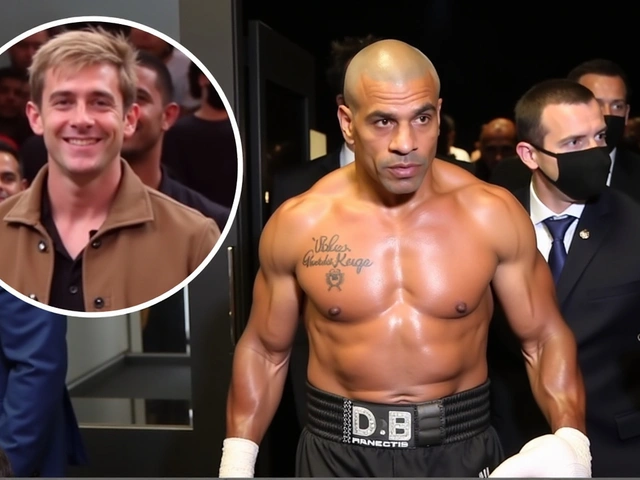Rod Stewart Faces Mixed Reactions in Germany for Saluting Ukraine's President Zelensky

At a packed Quarterback Immobilien Arena in Leipzig, Germany, on June 14, 2023, Sir Rod Stewart found himself at the center of an unforeseen controversy. The 79-year-old British rock legend, known for his timeless hits and energetic performances, was met with a wave of boos and jeers when he publicly saluted Ukraine's President Volodymyr Zelensky during his concert. Stewart's tribute included the display of the Ukrainian flag on a large screen behind him while images of Zelensky flashed intermittently, an act that seemingly displeased a segment of the audience.
Despite the negative reaction from the crowd, Stewart remained steadfast and undeterred. He continued his set with the same vigor and passion he is known for, performing his 1991 hit 'Rhythm of My Heart'. This particular song has been dedicated to Kyiv during his recent tours and has taken on new meaning as an anti-war anthem in the light of the ongoing conflict in Ukraine. Without missing a beat, Stewart used his platform to express his unwavering support for Ukraine, a stance he has maintained since Russia's invasion of the country in 2022.
Stewart's Advocacy for Ukraine
Rod Stewart's commitment to the Ukrainian cause goes beyond symbolic gestures on stage. Earlier this year, in February 2023, Stewart openly criticized Russian President Vladimir Putin, labeling him an 'a***ehole' in a clear and bold statement of disapproval. His outspoken nature doesn't stop there; Stewart has also voiced concerns over the potential withdrawal of U.S. support for Ukraine, highlighting the ongoing necessity for international backing in times of crisis.
A Personal Commitment
The rock legend's dedication to Ukraine is not just vocal, but also deeply personal. In October 2022, Stewart opened his Berkshire home to a Ukrainian refugee family of seven. He provided them with not only a place to stay but also financial support for at least a year. This act of kindness was a manifestation of the responsibility Stewart felt after being knighted in the Queen's 2016 birthday honors for his contributions to music and charity.
Stewart's motivation to help did not end with this single family; he has considered expanding his efforts to assist more individuals affected by the conflict. His actions are a direct response to the severity of the situation as well as a reflection of his personal and professional values. Being knighted has only heightened his sense of obligation to give back and make a tangible difference in the lives of those who are suffering.

Audience Reactions
The mixed reactions from the German audience serve as a reminder of the diverse perspectives held by individuals regarding global political issues. While some attendees may have disapproved of the blending of entertainment with political statements, others may have appreciated Stewart's bravery in using his influential voice to support a significant cause. The audience's response also underscores the complexities of public sentiment about the war and political leadership, highlighting the varying degrees of support for Ukraine and its president across different regions.
Nevertheless, the adverse response did not deter Stewart from continuing his performance and conveying his message. His commitment to his beliefs and his willingness to face criticism demonstrate his steadfastness and resilience as an artist and a humanitarian.
A Larger Conversation
This incident at Stewart's concert is part of a larger conversation about the intersection of music, politics, and activism. Artists like Stewart have a considerable platform and influence, and their actions and words can resonate deeply with their audiences. In these modern times, fans and spectators expect more from their idols than just entertainment; they anticipate them to take a stand on pressing social issues and to be leaders in advocating for change. By publicly supporting Ukraine and President Zelensky, Stewart aligns himself with a growing number of artists and public figures who use their fame to champion causes they believe in.
Ultimately, Rod Stewart's act of solidarity with Ukraine during his Leipzig concert is a testament to his enduring dedication to humanitarianism and advocacy. Regardless of the mixed reactions he received, his message withstood the boos, resonating with those who share his vision of a more just and peaceful world. As Stewart continues his tour, his actions will likely inspire more dialogue and reflection on the pivotal role that artists can play in shaping public discourse and supporting global causes.






Hariom Kumar
June 17, 2024 AT 19:03Rod Stewart’s heart is bigger than any booing crowd! 😊
Phillip Cullinane
June 18, 2024 AT 22:50From a strategic communications perspective, Stewart’s decision to integrate geopolitical symbolism into a live performance constitutes a high‑stakes signaling maneuver that transcends conventional entertainment paradigms.
By projecting the Ukrainian flag and juxtaposing it with President Zelensky’s visage, he leverages the concept of soft power to catalyze audience affective alignment.
This alignment, however, encounters a heterogenous reception matrix within the German demographic, where prior exposure to Eastern European conflict narratives modulates the hedonic valence of the stimulus.
Empirical studies on crowd dynamics suggest that sudden political intrusions can trigger cognitive dissonance among attendees whose primary expectation is auditory immersion.
Consequently, the boos represent an affective feedback loop rooted in perceived relevance misalignment.
Nonetheless, Stewart’s adherence to the ‘Rhythm of My Heart’ as an anti‑war anthem exemplifies narrative framing that recontextualizes lyrical content to serve a humanitarian agenda.
The value chain of philanthropic advocacy is further amplified when the artist operationalizes personal resource allocation, such as housing a Ukrainian refugee family, thereby converting symbolic capital into tangible social impact.
From an organizational behavior lens, this behavior aligns with transformational leadership qualities, wherein personal ethos is projected onto a broader stakeholder constituency.
Moreover, the public condemnation of Russian leadership, articulated in colloquial profanity, functions as a brand differentiation tactic that solidifies his activist brand identity.
Stakeholder theory would posit that Stewart is expanding his fiduciary responsibility beyond shareholders-i.e., fans-to encompass global citizenry.
In this light, the mixed audience reaction can be interpreted as a microcosm of the broader geopolitical polarization observed across Western societies.
The integration of media studies discourse underscores the performative nature of political statements in popular culture, where the stage becomes a contested arena for ideological contestation.
Future research could quantify the net sentiment shift attributable to such interventions, employing sentiment analysis algorithms on post‑concert social media streams.
Ultimately, the incident exemplifies the intersection of art, advocacy, and audience agency, reinforcing the notion that cultural icons wield measurable influence over public discourse.
While the immediate acoustic feedback may have been negative for a segment of the crowd, the longitudinal impact on awareness and empathy could be substantially positive.
In sum, Stewart’s conduct embodies a multidimensional strategy that fuses entertainment, activism, and philanthropy, thereby setting a precedent for artist‑driven humanitarian engagement.
Janie Siernos
June 20, 2024 AT 02:37It’s disheartening to see entertainment venues become platforms for political grandstanding, even when the cause is just.
joy mukherjee
June 21, 2024 AT 06:23I get that some fans just want to rock out without a side‑track into world politics, but seeing a legend stand up for people in need feels genuinely moving. 😌 It reminds us that musicians can be more than just performers-they can be voices for the voiceless.
Rob Chapman
June 22, 2024 AT 10:10Music speaks louder than words really and helping people is what matters
Delaney Lynch
June 23, 2024 AT 13:57Wow!!! What a bold move by Stewart!!! Did he anticipate the backlash??? I love that he’s using his platform for good, but I’m curious-how many other artists are following suit??? It would be fascinating to see a comparative study of celebrity activism in the current geopolitical climate!!!
Nicholas Mangraviti
June 24, 2024 AT 17:43Stewart’s act shows art can still matter.
Jared Greenwood
June 25, 2024 AT 21:30Patriotic crowds expect entertainment, not foreign propaganda-anyone dragging politics into a concert is distracting from the music and disrespecting the host nation’s audience.
Sally Sparrow
June 27, 2024 AT 01:17Honestly, the whole spectacle is a performative virtue‑signaling exercise that cheapens genuine activism; it’s more about the media spin than real impact.
Eric Yee
June 28, 2024 AT 05:03yeah the vibe was mixed but i think his heart was in the right place